A testament to the Andean gods survives in Bolivia’s capital

In this July 10, 2018 photo, a vendor at the Witches’ Market drinks coffee at her shop full of Andean weavings and embroidery in La Paz, Bolivia. The office of the La Paz mayor is now promoting a law that would pay tribute to the Witches’ Market, as a first step before authorities request UNESCO World Heritage status for the site. (AP Photo/Juan Karita)
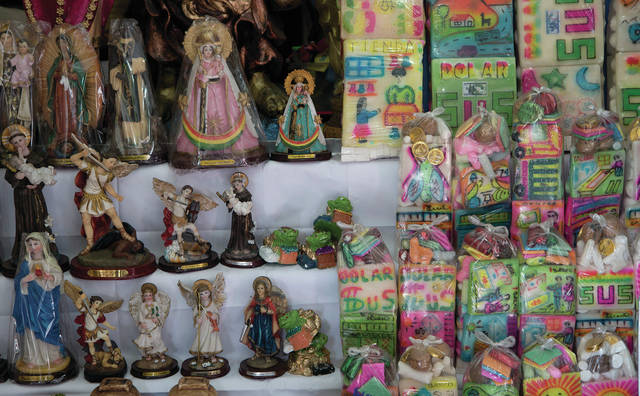
In this July 12, 2018 photo, religious statues and offerings to the “Pachamama” or Mother Earth stand for sale at the Witches’ Market in La Paz, Bolivia. At the market, llama fetuses hang above stalls, incense perfumes the air and herbs are offered to the mother earth spirit. (AP Photo/Juan Karita)
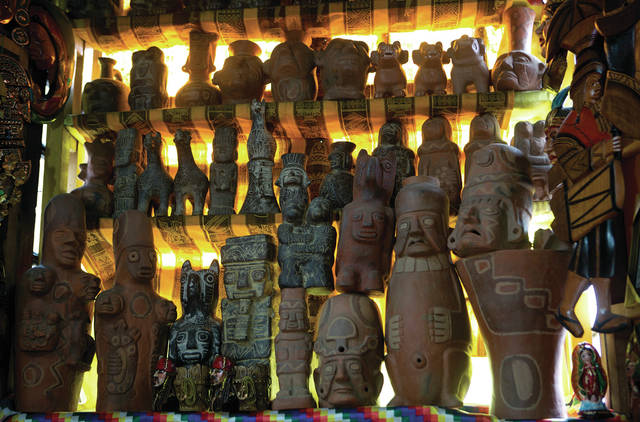
In this July 10, 2018 photo, Andean vessels and amulets are displayed for sale at a shop in the Witches’ Market in La Paz, Bolivia. Anthropologists say that the indigenous would camouflage their beliefs under Catholic ones, creating a blend of Christian and ancestral rites, called religious syncretism. (AP Photo/Juan Karita)
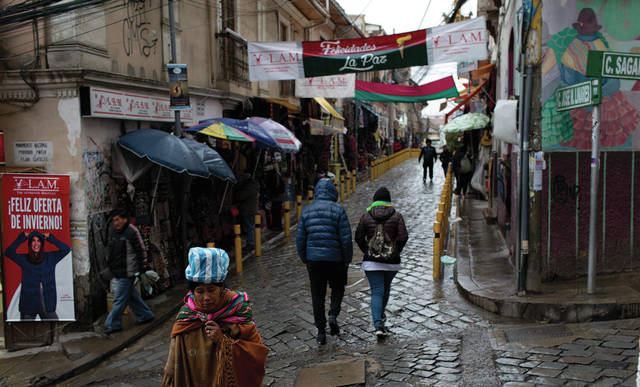
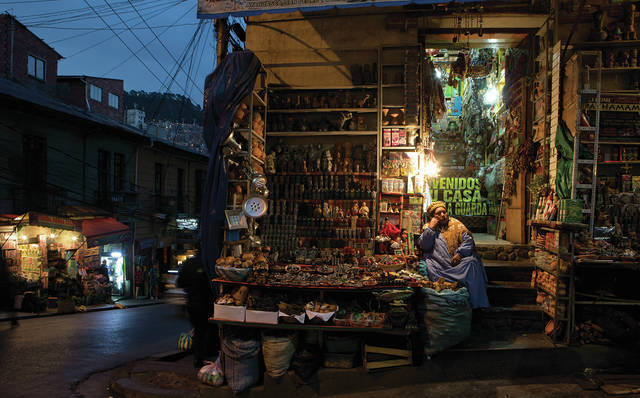
In this July 10, 2018 photo, a woman sits at her shop of Andean amulets and offerings to the “Pachamama,” or Mother Earth, at the Witches’ Market in La Paz, Bolivia. At the market, people buy medicinal plants to heal their bodies and ward off curses, while “yatiris,” or indigenous healers, offer to read their fortunes on coca leaves. (AP Photo/Juan Karita)
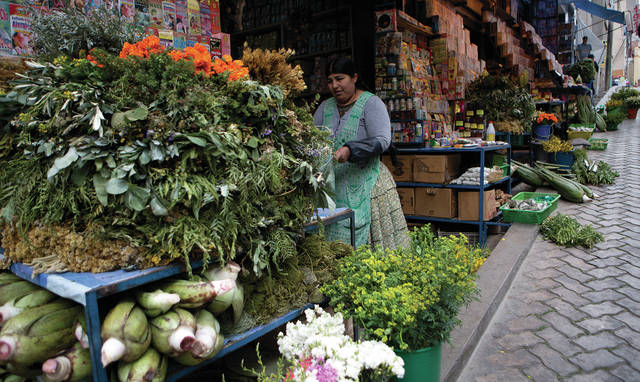
LA PAZ, Bolivia — At the Witches’ Market in Bolivia’s capital city, llama fetuses hang above stalls as offerings to the mother earth spirit known as Pachamama. Tourists and residents line up to buy medicinal plants to heal their bodies and ward off curses, while “yatiris,” or indigenous healers, offer to read their fortunes on coca leaves. Incense perfumes the air.
LA PAZ, Bolivia — At the Witches’ Market in Bolivia’s capital city, llama fetuses hang above stalls as offerings to the mother earth spirit known as Pachamama. Tourists and residents line up to buy medicinal plants to heal their bodies and ward off curses, while “yatiris,” or indigenous healers, offer to read their fortunes on coca leaves. Incense perfumes the air.
It’s all part of the mystical aura of this colorful market devoted to the worship of ancient Andean gods. The market seems stuck in time amid the urban chaos of La Paz, in a neighborhood just blocks from the presidential palace.
ADVERTISING
“This is live ancestral wisdom mixed with new elements, but it keeps its roots,” said David Mendoza, a sociologist and member of the La Paz municipality patrimony directory.
Before the Spanish colonizers arrived, this was sacred ceremonial ground where animal blood was offered to thank the gods for an abundant harvest. Those sacrifices don’t take place here now, but other practices once considered pagan have survived efforts to uproot them. And the site has become a major tourist attraction.
“Witchcraft is not ours, it’s related to the devil (beliefs) that were brought by the Spanish colonizers,” said Helena Martinez, a spiritual guide. “Our thing is all about culture. And the offerings to the gods seek harmony with nature.”
In this same place in 1549, the Franciscan order built a church. It was rebuilt some 200 years later by indigenous people who had converted to Catholicism. In its baroque-styled facade, they carved in stone the head of a bull, a symbol of the colonizers, as well as Franciscan shields, and a bare-breasted goddess, who Mendoza says is Pachamama, a symbol of earth’s fertility for Andean cultures.
Anthropologists say that the indigenous would camouflage their beliefs under Catholic ones. That created a blend of Christian and ancestral rites, called religious syncretism. It is recognized by Bolivia’s constitution under the term “Andean cosmovision,” and it is widely practiced by many in the mostly indigenous South American country.
Llama fetuses remain one of the most popular and exotic offerings to Pachamama at the market.
“Every offering is prepared by us and has its own meaning,” said Veronica Quispe, a ritual organizer. “It’s like offering a plate of food to Pachamama as a way to thank her.”
The llama has traditionally been regarded as sacred to the Indians of Bolivia and other Andean countries because it was a source of wool, transportation and food. The fetus of the animal symbolizes the messenger that takes requests from people to the gods, Quispe said.
A plaque at the atrium of the San Francis church that is part of the market reads: “What began causing divisions, ended up uniting two cultures in a rich blend of cultures that marks the identity of this unique city.”
The office of the La Paz mayor is now promoting a law that would pay tribute to the market. It is as a first step before authorities request UNESCO World Heritage status for the site.
The market is also a bridge to modernity. The indigenous women of the Andes usually wear traditional bowler hats, wide pollera skirts and embroidered shawls. But at the market, T-shirts depict one of them at sea riding a surfboard, even though Bolivia is landlocked.
Tourist agencies at the market offer an adventurous bike ride through “el Camino de la Muerte.” That’s the Highway of Death, a 40-mile (64-kilometer) road carved into mountainside that drops 11,700 feet (3,600 meters) from the snowcapped Andes to the steaming jungle.
Medicinal plants at the market range from herbs to cure coughs to natural Viagra, along with magic powders that promise to keep lovers away.
Popular treatments include aloe vera to heal ailments, and herbs like rosemary and broom to attract good luck and keep curses away, said Naralia Mamani, who owns one of the shops at the market and who learned the trade from her ancestors.


